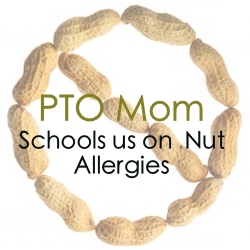Do you, or someone you know suffer from a nut allergy?
With the rise of food allergies today, it’s easy for people to become numb to the very real dangers associated with them. For most, the only safe options are avoidance and epinephrine shots, and sadly, there are several reported cases of deaths after epinephrine was administered. A very real, very scary reality for parents of allergy sufferers.
According to a 2010 study in the journal Pediatrics, 8% of children younger than 18 in the United States have at least one food allergy. Among those with food allergies, about 39% had a history of severe reaction, and 30% were allergic to multiple foods.
Peanut allergy is the most common food allergy, followed by milk and shellfish. In fact, according to the Centers for Disease Control and Prevention, more than 90% of allergic reactions come from just eight foods: milk, eggs, peanuts, tree nuts, fish, shellfish, soy and wheat.
Recently we were contacted by a health author about the risks of traveling for those who suffer from peanut allergies. It’s something we don’t personally deal with around here, but we have friends who’s kiddos are nut allergic. It’s something they have to remain ever-vigilant about, protecting their children from exposure to such a commonly used ingredient. I often think about them when I’m on a flight and the airline passes out nut snacks.
So what do you do if you travel and you suffer an allergy attack? Ella Moss and Bill Johnson have some tips for you to consider. Ella Moss is a health and addiction writer who works for a number of consumer advice sites. She paired up with Bill Johnson, a finance writer and expert for a leading consumer advice portal, to produce a guide for travelers with nut allergies looking to travel safely, with adequate insurance cover. It’s often surprising to those who don’t suffer from an allergy how difficult some seemingly simple day to day situations can be. Hopefully this guide will bring you up to speed.
Suffering from an allergic reaction on holiday is horrible enough; but it’s even worse if your travel insurance won’t payout for treatment. Here’s how to make sure that doesn’t happen to you. Read more: http://www.money.co.uk/article/1010225-travel-insurance-if-you-have-a-nut-allergy.htm#ixzz2xpzLFxOV
The article is published in the UK but definitely has relevance to us here in the US.
Please share your stories with us about how you stay safe during your travels!



